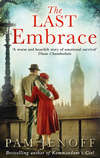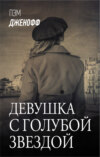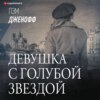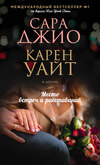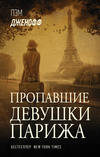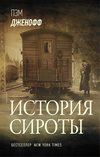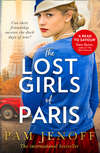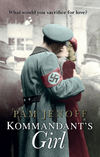Czytaj książkę: «The Last Embrace»
Praise for
Pam Jenoff
‘This love story will melt you.’
—Company magazine on The Ambassador’s Daughter
‘This is historical romance at its finest.’
—Publishers Weekly on Kommandant’s Girl
‘In her moving first novel, Jenoff offers an insightful portrait of people forced into an untenable situation and succeeds in humanising the unfathomable as well as the heroic.’
—Booklist on Kommandant’s Girl
‘Poignant and intense’
—Good Book Guide on The Diplomat’s Wife
‘Jenoff explores the immediate aftermath of World War II with sensitivity and compassion, shedding light on an often overlooked era of European history. She expertly draws out the tension and illustrates the danger and poverty of Eastern Europe as it falls under communism. Highly recommended for all fiction collections.’
—Library Journal on The Diplomat’s Wife
‘… well constructed and a real page-turner’
—Birmingham Jewish Weekly on The Diplomat’s Wife
PAM JENOFF is the author of several novels, including the international bestseller Kommandant’s Girl, which also earned her a Quill Award nomination. Along with a bachelor degree in International Affairs from George Washington University and a master’s degree in History from Cambridge, she received her Juris Doctor from the University of Pennsylvania and previously served as a Foreign Service Officer for the US State Department in Europe, as the Special Assistant to the Secretary of the Army at the Pentagon and as a practising attorney. Pam lives with her husband and three children near Philadelphia where, in addition to writing, she teaches law school.
Visit Pam at www.pamjenoff.com
The Last Embrace
Pam Jenoff

For my own brother, Jay
Contents
Cover
Praise
About the Author
Title Page
Dedication
PROLOGUE
PART ONE
ONE
TWO
THREE
FOUR
FIVE
SIX
SEVEN
EIGHT
NINE
PART TWO
TEN
ELEVEN
TWELVE
THIRTEEN
FOURTEEN
FIFTEEN
SIXTEEN
SEVENTEEN
EIGHTEEN
NINETEEN
TWENTY
TWENTY-ONE
TWENTY-TWO
PART THREE
TWENTY-THREE
TWENTY-FOUR
TWENTY-FIVE
TWENTY-SIX
TWENTY-SEVEN
TWENTY-EIGHT
EPILOGUE
ACKNOWLEDGMENTS
Reader’s Guide for The Last Embrace
QUESTIONS FOR DISCUSSION
Endpages
Copyright

New Jersey August 1944
I sense home before I can see it. Five miles out, the wet salt air enters my mouth and fills my lungs, and the cries of the gulls rise harshly to meet me. But it isn’t until I round the final curve and the wide expanse of murky brown water springs into view that the lump in my chest grows and my eyes begin to burn.
“Damn you,” I say aloud as I pull to the side of the road. “God damn you to hell.”
Absecon Bay remains unmoved. Its calmness seems hypocrisy.
I shift Uncle Meyer’s Buick into gear once more; the engine revs weakly. It is midafternoon and the sun glistens high above the water, the air late-summer warm. The smell of fresh lemon polish rises from the dashboard, mingling with the sea air and lingering cigar smoke. A station wagon passes in the opposite direction, laden with beach chairs and a barbecue grill. Despite the war, some things have not changed: the flight of the summer renters, dusting the sand off their sticky-fingered children and returning to normal life as Labor Day nears, is still the earliest sign of fall. Along the Black Horse Pike on my way down the shore, the prices of peaches and cherries and other summer produce, plentiful even while other food is in short supply, have been slashed, preparing to give way to apples and gourds. Hand-painted signs tout end-of-season corn. Some of the drive-up stands that did a brisk business in hot dogs and root-beer floats all season have already closed.
I pull onto the road, passing signs that exhort me to watch the coast vigilantly for German ships and to buy war bonds. As I guide the car along the edge of the bay, high sea reeds rise from the marshes, obscuring my view of the water. Exhaling, I focus on the casual tangle of shops ahead. Everything had seemed so much bigger in my mind’s eye. Now the houses, with their blackout curtains and flags, are miniature, like the ones Uncle Meyer built alongside his model railroad. The whole place could use a good coat of paint.
I begin to climb the gentle arc of the bridge. A narrow strip of water lined with docks and small boats comes into view. I startle, accidentally slamming on the brake and scarcely hearing the car horn that blares behind me.
I wipe my damp palms against my cotton skirt, which has become wrinkled during the drive. Then I press my foot against the accelerator and continue south, clenching the steering wheel, knuckles white. “Knock it off,” I mutter aloud through gritted teeth, “or you’ll never make it.” Which, as I think about it, does not seem like a half-bad idea.
Just before the Esso station marked with rationing notices, I take a right turn and then another. Then I turn left onto Sunset Avenue. The block which holds such weight in my memories is nothing more than a half dozen or so houses parallel to the bay, built decades earlier, their clapboard fronts scarred, like the lined face of an old woman, from the storms they have weathered. As I drive past each house, I rattle off mentally the people who had lived there: at the fourth house, kindly Mrs. Henderson, known as Aunt Molly to the kids, Joe and Louise Steiner at the fifth. Many of the neighbors are undoubtedly the same—except for the sixth house, which has been vacant since the day the Connallys drove out of my life forever.
I stare straight ahead, trying to focus on the road. But it is no use—even in broad daylight, I see the nightmare that I have lived so many times in my sleep: I am standing on a narrow, deserted strip of the boardwalk, looking out at the vast green-gray ocean. I watch as the tide comes in and the water level grows continually higher. A black wave rises like an enormous hand to twenty feet or more. The wall of water crashes down from above, knocking me to the ground and enveloping me completely. I fight, unable to stand or breathe, as the water fills my lungs and swallows me whole.
Suddenly my vision clears, the image gone as quickly as it came. I tell myself that it isn’t real, that the past will not return. Why be afraid when there is nothing left to lose? But it is no use.
My nightmares have returned again, the surest sign that I am home.


Washington, DC November 1943
I did not fight the umbrella which blew inside out as I stepped from the streetcar. Instead, I clung tighter to my nearly soaked cloche to hold it in place against the icy rain that slanted sideways across Pennsylvania Avenue. Navigating the slick pavement carefully, I swam through the midafternoon crowd, mostly women and a few men too old or broken for service, who were waiting in line at the Red Cross canteen truck for coffee, or making their way between government buildings and the makeshift tent offices that lined the Mall.
Brushing the raindrops from my overcoat, I slid under the awning that shielded the security booth outside the Department of State Building, pausing to fumble for my press pass. The guard eyed me incredulously as he scrutinized my credentials. Ignoring him, I gazed up at the White House, pale against the stormy gray clouds. Something moved on the roof above, the swivel of an anti-aircraft gun pointed upward. My heart skipped. Washington was a city occupied not just by the thousands who had come here to work, but by the army that defended it as though the Germans might at any moment descend from the sky.
Lowering my eyes, I caught a wistful glimpse of my disheveled reflection in the window of the guard booth. I’d left the rooming house in good form to a sky that, if not sunny, had certainly not suggested this downpour. Arriving at the Post, I expected a day like most I’d had these past few months, typing stories from shorthand notes on a Remington at a desk barely wide enough to hold it, pressed close to a dozen other girls. I didn’t mind; I needed work and I was grateful that my high school secretarial course had qualified me for it. Though it would have paid a few dollars more, I had dreaded the prospect of working as one of the government girls at the War Department. I couldn’t bear to endlessly type letters telling families that their sons were not coming home, seeing Charlie’s face in each of them.
During my first few months at the news bureau, the work had been quiet and predictable. But one afternoon nearly two weeks ago, a man with his sleeves rolled up had opened the door to the steno pool. “Italian?” he bellowed. A cloud of cigarette smoke appeared before him as he exhaled, making him seem a gray-haired dragon. The room fell silent. Chip Steeves, managing editor of the Washington Post, never came into the typing room. “My secretary is out and I need someone to call a translator.” Impulsively, I raised my hand. Then I looked around. I was the only one and I started to lower it.
But Mr. Steeves was already weaving his way through the desks, descending upon me. “You can find me someone to translate Italian?” He spoke through the cigar stub clenched between his teeth.
“No.” I looked at him squarely. “I can do it myself.”
He eyed me for several seconds, his face a scowl. “Well, come on,” he barked impatiently, as though I, and not he, had hesitated. I could feel the eyes of the other typists on me as I walked from the room.
“Montforte, isn’t it?” he asked, surprising me as we entered his office. The desk was covered in piles of papers, the floor littered with dirty coffee cups.
“Yes.” I cleared my throat. “Addie, that is Adelia.”
He didn’t introduce himself; he didn’t need to. Chip Steeves was legendary as journalist and terror. “You’re the girl who caught that mistake in the U-boat story.” I straightened slightly. My job was only to type articles, not proofread them. I had seen an error in one of the stories, though, a date that I knew from my own reading was wrong. I had pointed it out to Mr. Steeves’s secretary, who oversaw the typists. But I did not know that the message had been passed on—or that I had received credit. “That was good work. You speak Italian?”
“Yes. I was born in Trieste.” Being foreign-born was not something that one announced loudly these days, and I’d worked hard to remove all trace of an accent. This might be the first time it was an asset.
He thrust out a pen as if he might hit me with it, and I fought the urge to cower. “Well, translate this, Adelia Montforte.” I took the paper he offered and moved an overflowing ashtray from the nearest chair, then perched on it and scrawled the translation hurriedly. It was a cable about a skirmish that had taken place near Salerno, brief but with a few military terms I wasn’t quite sure I’d gotten right.
When I finished, I handed it back to Mr. Steeves, who scanned the page. “This is good.”
“I could do better with more time,” I offered.
“Couldn’t we all? But you don’t botch the feel of it, like the real translators do.”
After that, Mr. Steeves sent more translation work my way through his secretary. But he had not reappeared himself—until this morning. “Montforte,” he hollered as he stuck his head into the steno pool, causing me to jump. I’d leapt up and grabbed my pen and pad, assuming it was another translation job. But when I started for the door of his office, he waved me away. “Be at the State Department this afternoon at three.”
I stared at him blankly. “Me? But why?” He tossed me a press pass and disappeared into his office.
The guard handed back my pass now, along with a visitor’s badge, which I pinned to the collar of my blouse. I stepped uncertainly into the massive lobby of the State Building, marveling at the high chandelier, better suited to a ballroom. But before I could take it all in, Mr. Steeves appeared, grabbing me by the arm. He led me unceremoniously past a marble staircase, down a corridor and into a room with a long oak conference table. “The deputy secretary has called a meeting with the press to talk about our coverage of our allies, making sure it doesn’t hurt the war effort, that sort of thing.”
“I don’t understand. Isn’t there something you need me to translate?”
He shook his head. “Nah, kid. My cub reporter’s been called up so I need someone to help me cover the meeting. You were the best one for the job.”
“The best one? I’m a typist. I can’t possibly cover a story.”
“Just take one of the chairs against the wall and take notes. And don’t say anything,” he instructed, then disappeared into a group of uniformed men clustered in the corner.
I took off my overcoat and folded it in the lap of my navy blue skirt, noticing as I sat down a run in my nylons. Then I tried to smooth the wrinkles from my pleated-front blouse. I was the only woman in the room, except for the one setting out coffee cups. The war might have brought women to work, Rosie the Riveter and all that, but in high-level Washington meetings like this, the seats at the table were still reserved for the men.
The door opened and a man I recognized from the papers as Undersecretary of State Edward Stettinius came in. “Be seated,” he said, as the others came to the table. “I’ve only got a few minutes so I’ll be brief. I’ve called you here to ask for your help in talking to the American people about the war.” He launched into a discussion of a new initiative by the Office of War Information to work with the press on the way it would communicate information about the fighting.
I scribbled furiously. Though I frequently typed the shorthand notes of others, I had seldom taken dictation and I feared I would not be able to keep up with Secretary Stettinius’s rapid English. But as I listened, I became absorbed by what he was saying. The relationship between newspapers and government had always seemed adversarial, one seeking information and the other holding it back. But he was speaking now of ways they could work together. “I’m happy to take your questions,” he concluded a few minutes later.
A correspondent from the Washington Star whom I did not recognize raised his hand, then spoke without waiting. “It sounds good on the surface—but isn’t it something of a conflict of interest?” I had been wondering the same thing: Could the newspapers still maintain their independence and integrity while working with the government?
Secretary Stettinius offered a vague explanation of how it would all work without compromising the independence of the press.
“Surely you aren’t suggesting we show you our stories before they go to press?” another reporter pressed. “That would be censorship.”
“No, of course not,” Secretary Stettinius replied, looking tugging at his collar. “We simply want to be a resource.” Across the room, Mr. Steeves folded his arms, unconvinced. “My deputy will be in touch with each of you individually to discuss specifics,” Secretary Stettinius promised, cutting the questions short. He rose, signaling that the meeting was over.
As the newsmen stood and chatted among themselves, I tried to catch Mr. Steeves’s eye, but he was engrossed in conversation with a foreign correspondent. I made my way toward the door of the too-stuffy room, uncertain whether to wait for him or return to the bureau.
As I neared the massive foyer, a door across the hallway opened, letting loose a low din of chatter from another meeting. I started past. “Then we are agreed,” a voice broke through the others, unexpectedly familiar. I stopped mid-step. “We’ll meet again when we have the plans drawn up.”
Charlie! My head swiveled in the direction from which the voice had come. It couldn’t be. I craned my neck, trying once more to hear the voice. I had imagined him so many times since coming here, seen him in every uniformed soldier on the street corners. But I’d never heard his voice.
I stepped toward the door of the other room, not caring that I had no business being there as I scanned the crowd. “Oh!” I cried so loudly that a man in front of me turned to stare. I brought my hand to my mouth as Charlie’s broad shoulders appeared above the others. Joy surged through me, making my head light. It really was him. But how? There was no reason on earth for him to be in Washington. He was meant to be off training somewhere or deployed, not standing in front of me, tall and glorious. Had he come for me? No, there was simply no way he could have known I was here—which was exactly how I had wanted it.
Anxiety rose, eclipsing my happiness, and the walls of the immense room seemed to grow close. I started to duck away, the idea of facing Charlie unfathomable. But even as I took a step toward the door, I turned back, drawn to him. He looked different to be sure, aged by all that had happened, with lines in places I hadn’t remembered and a permanent sadness about the eyes. His brown hair was cut short and it was thinner, too, without the thick, rich curls he had once had. He was still beautiful, though. My breath caught. That did not, could not, change what had happened. I had to leave. Now.
I stepped back toward the corridor, my ankle turning inward and causing me to stumble. As I struggled not to fall, I dropped my notebook, which clattered against the marble. Heads turned in my direction, seeming more annoyed than concerned. As the others resumed their conversations, Charlie stepped from the group and moved toward me in the hall, his face breaking. “Addie?” His tone was disbelieving. I froze, unable to move or speak as he drew close. He reached out, as if to touch me, but his hand foundered midair before falling to his side again. He leaned in to kiss my cheek and his familiar scent made the room wobble. I struggled not to turn and meet his lips with my own. “Addie.” There it was in that single word, that voice which cut right through and connected with my insides as it had since the first time I heard it. “What are you doing here?” He didn’t know any of it—that I had left Philadelphia, or how I had come to be here. Because he had gone first.
“I’m working for the Post.” I watched his face for any sign of disbelief. But Charlie had never doubted me. “I never expected you to be in Washington,” I added.
His face flinched slightly as though he had been slapped. “You aren’t pleased to see me.”
“Of course I am. It’s just that I thought you were training.” My words came out too quickly, piling on top of one another.
He fumbled with the hat, neatly folded in his hands. “I was, for almost a year. But now I’m here for some extra briefings.” There was a strange undercurrent to his voice. A year had slipped through our fingers. How was that possible? Once it had seemed unthinkable to keep breathing without Charlie, but somehow the clock had kept ticking. I tried to imagine his days in between, all of the things he had done and seen since we’d last laid eyes on one another. But my mind was blank.
“Your hair,” he blurted. I raised my hand to my temple, wincing at how tousled I was from the rain. “It’s short.” It was the bob, so different than last time he had seen me. “I mean, I like it.” I couldn’t tell if he was just being kind.
“How’s your family?”
“Holding up as well as can be expected.” He shrugged, helpless but not indifferent. “My folks are in Florida. Mom has thrown herself into the women’s auxiliary.” It sounded so much like Mrs. Connally that I had to smile. “Dad’s Dad.” Guilt at having left them flickered across his face. “It tore them apart, you know.” Yes, I knew only too well. The Connallys lived in a place where their grief would always be as raw as the day it all happened, no matter how much time passed or how far away they moved. “They’re together, but in a separate kind of a way. They know now,” he added, and I wanted to ask if he meant about the army, or what had been between us, or both.
The question stuck in my throat. “And the boys?” I asked instead.
“Jack, well, he works at a plant in Port Richmond. He’s taking night classes at Temple, though.” Jack had been the real brain of the boys—he might have gone to an Ivy League school and practiced medicine as he once dreamed, but for money and circumstance. “He hasn’t been called up yet, thank God. Mom couldn’t bear to lose another son.”
I swallowed. “And Liam?”
Charlie stared hard at the floor. “I’m not sure.” But surely his parents knew about Liam’s whereabouts, and whether or not he was okay. Or had they cut ties with him as well? My stomach tugged. I still hated Liam for what he had done, yet I could not help but worry.
Charlie and I watched one another, not speaking. We had talked about everyone, of course, except the one name we could not say. “How long will you be in town?” I asked, not sure what answer I was hoping to hear.
Before Charlie could reply, voices came from the conference room behind him. He looked over his shoulder. “There’s another meeting. I’m going to have to go.” A knife ripped through me at the idea that he might leave again just as quickly as he had appeared. “Addie, I want to talk to you. Meet me tonight?” he said suddenly. “The Old Ebbitt Grill at seven.” So he did not want our chance reunion to end either.
I peered at him, trying to read the meaning behind his words. Were we merely two old friends, trying to catch up? No, it was still there, that hungry, yearning look in his eyes I had first seen the night on the dock. He wanted to pick up once more and return to that moment when we had stood on the edge of the world, gazing down at everything that lay before us. He wanted to make things whole again.
Something licked at my insides then, familiar like a forgotten dream: hope. Even after everything that had happened, Charlie still reached a place in me that made me believe things could be good again.
But something held me back. “I don’t know.” I was suddenly angry. Did he really think we could put all of those broken pieces back together and not see the cracks? Doubt thundered beneath my feet like a freight train and the ground began to sway. I had managed to make my way back from the place that nearly killed me and stand despite it all. I could not afford to let him in and risk going there again.
“Please, Addie. I’ll wait for you.” There was a desperation about him I had only seen once before in my life. Before I could answer, the men spilled forth from the conference room, enveloping Charlie, and we were separated by a sea of suits and uniforms giving off the odor of cologne and cigarette smoke. I had not had the chance to answer.
Our eyes met and locked, his making a silent plea before he slipped from sight.
